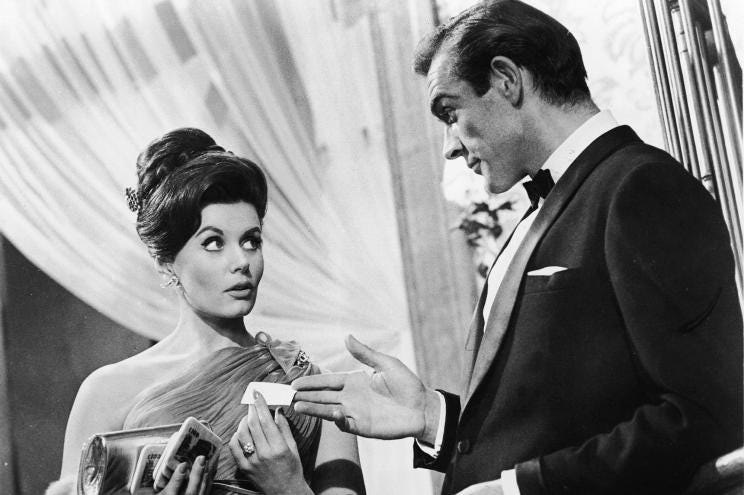How Gentlemen Used to Speak
A Direct Contrast to Modern Norms — Yet Worth Every Word
Modernity has taught people to be soft, to be apologetic, to be conformist.
This can be seen through modern media and in day-to-day interactions.
Though it’s true that this can be “variously different” from culture to culture, geography to geography…
The empirical truth you can observe is the lack of conviction in a man’s word.
I’ve known the issue — and the importance of it — from first-hand experience.
“Nice Guys believe that if they are ‘good,’ then they will be loved, get their needs met, and live a problem-free life.” — Dr. Robert Glover, No More Mr. Nice Guy
For a very long time — before I invented myself into the being so-called gentleman — I was your typical “Yes Man”, a “Nice Guy” who always agreed, avoided conflict, and tried to always be liked by others — shaping every act based on those desires.
But the further I developed and shifted my identity, the more I exposed myself to how men like Sean Connery or Cary Grant spoke… I realized there’s something deeply wrong with how men in the 21st century express themselves.
A way of communication that not only complicates their lives, but slowly erodes self-dignity and worth.
The Age of Conformity & Its Problem
“Whenever you find yourself on the side of the majority, it is time to pause and reflect.” — Mark Twain
Conformity means compliance with standards, rules, or laws.
From a sociological perspective, it’s understandable — even reasonable — for people in society to obey the code of conduct that keeps peace within the collective.
But the problem is this:
The “standards, rules, or laws” in 2025 no longer support or cultivate integrity, truth, or a masculine sense of self as a whole.
It has, quite literally, castrated the voice of a man and replaced it with an alternative agenda — one that creeps into every aspect of a modern man’s life, from childhood to adulthood.
Through the mechanism of Reinforcement Theory, as quoted by the father of the idea himself:
“A person who has been punished is not less inclined to behave in a given way; at best, he learns how to avoid punishment.” — B.F. Skinner
At school, kids are taught to agree — to discuss, yes — but only within a restricted frame, and punished for not being obedient.
At the workplace, conformity and agreeableness are the keys to being liked — and being liked often leads to promotion.
Society has shaped people, especially men, to avoid hard feelings. To surrender the power to control their own narrative.
To suppress their own ideas for the sake of being liked — of getting along — even when they hate it, and end up as a whisper or gossip behind the scenes.
Now, seeing all of this written out, I bet you’d agree this isn’t the best way to live —
Yet I also understand the complexity of not being a “Yes Man.”
The fear of being seen as arrogant.
Egotistical.
Lacking in social grace.
Funny thing is — you can speak with confidence, be unapologetically true to your ideas, and hold conviction in your voice without being rude or uncaring.
Because that’s how gentlemen used to speak.
(And let me tell you — it feels 100x more right for a man than what modernity offers.)
How a ‘Gentleman’ Once Spoke
When modern people think of Sean Connery — if they use today’s lens of “conformity,” softness, and hyper-consideration — they’d probably call him arrogant, a misogynist, a relic of inequality.
I won’t firmly say his controversial ideas — like slapping the opposite sex if he believed they “deserved it,” or his binary view on gender — are true or righteous.
In the end, that’s yours to decide.
But what I will offer is the framework of Constructive Deconstruction (which I’ve talked about in another post).
Through this lens, you can tap into timeless virtue — without inheriting the undesirable parts.
Because Connery — whether in real life or through his iconic 007 role — possessed what modern men lack:
Conviction.
An unapologetic attitude in expressing his mind.
The confidence of a man who knows who he is and doesn’t trade that for anyone’s approval.
And he did this without being loud, aggressive, disrespectful, or rude.
You can see this in multiple iconic scenes — from the way he flirted at Les Ambassadeurs with Sylvia Trench (Eunice Gayson), speaking at his own tempo, calm and non-needy — to his sharp confrontation at the Bahamas casino with Emilio Largo (Adolfo Celi), even while seated beside a stunning mistress (Claudine Auger) in Thunderball.
And if Connery feels too extreme for some, there’s Cary Grant — a gentleman of the Golden Age of Hollywood.
A man who mastered the balance of integrity and conviction with smooth, suave delivery — especially in his Hitchcock collaborations (To Catch a Thief, North by Northwest).
These men show us how real men once presented themselves — and spoke.
Men who stayed true to themselves, and gained inevitable social leverage in every single context and situation.
In day-to-day interaction, you can be a memorable presence to total strangers — your neighbor, a ticket concierge, the doorman — all by simply showing gratitude and presence in your voice.
In business and your career, you can reclaim your voice. Stand behind your ideas. Finally live up to your own potential.
In dating, you erase the modern game of submission and neediness - able to amuse the discerning woman — the one tired of half-hearted men flooding her DMs and showing soft signals in real life.
Because when you look at the big picture — changing the way you speak, to speak like a true gentleman — you go beyond social benefit.
You reclaim self-respect. You reclaim your worth.
You become a man whose word is sacred — and actually means something.
Because once you’re done being the “Yes Man”… and start speaking like a gentleman…
Your word gains iron will — a commitment that carries weight — and you hold yourself to everything that comes out of your mouth.
And honestly?
What’s better than a man who keeps every word with dignity?






